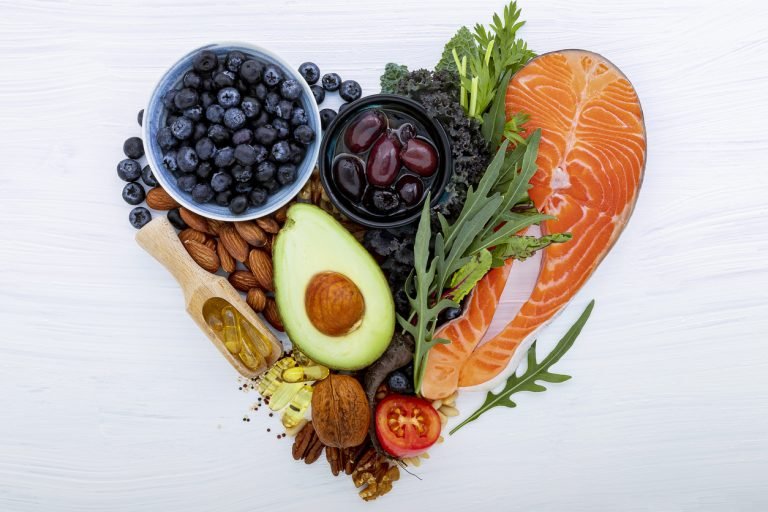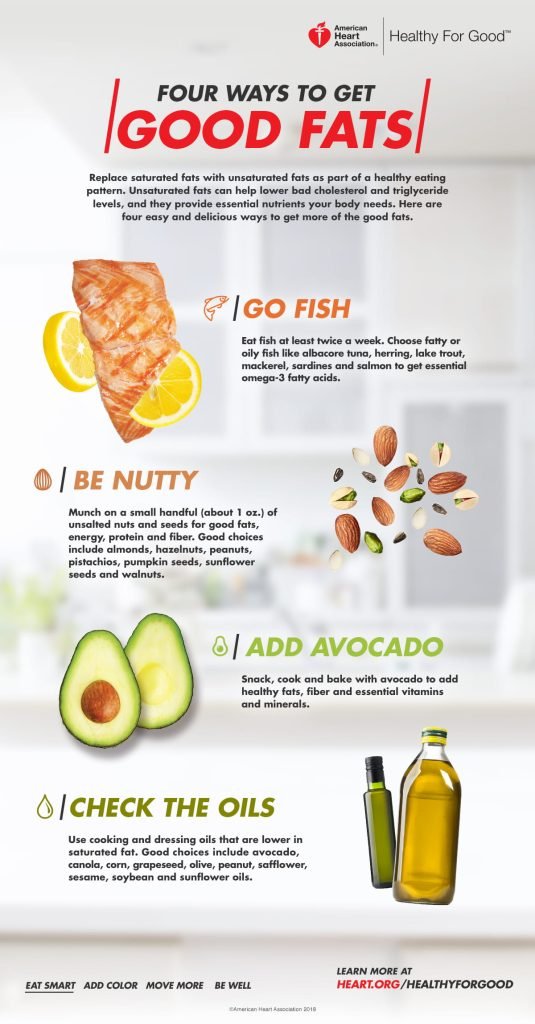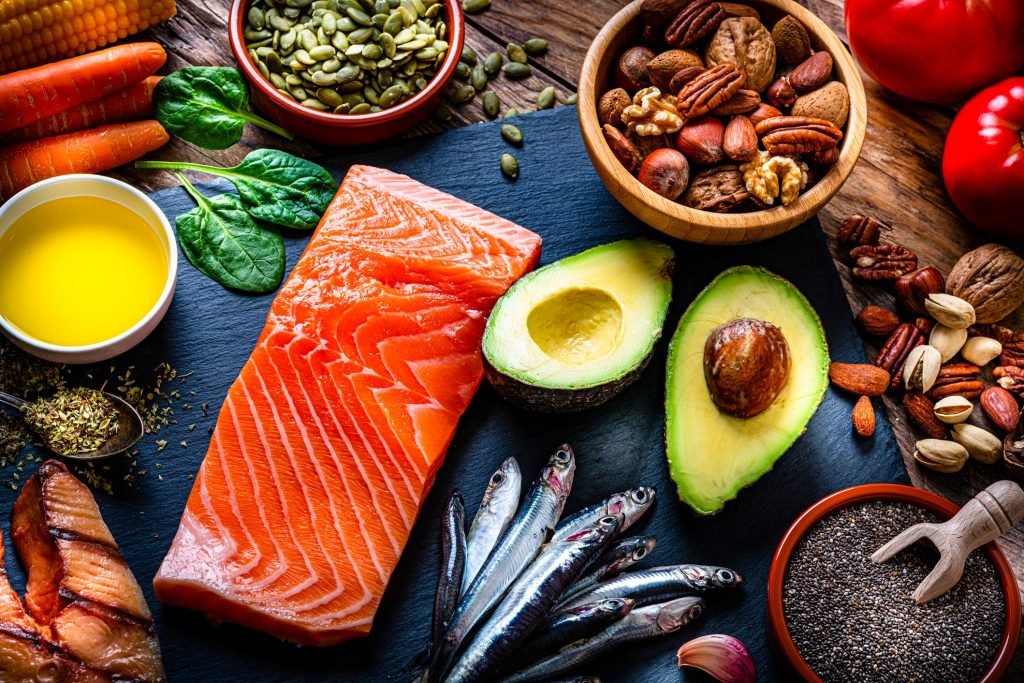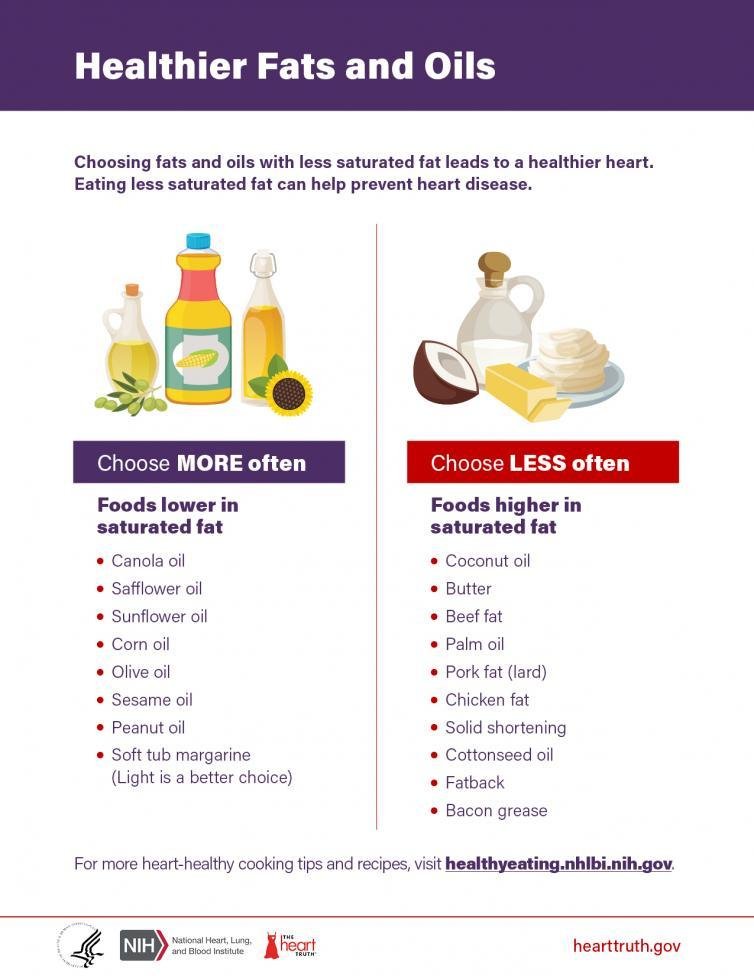
Have you ever wondered about the connection between healthy eating and fats? Well, look no further! “The Link Between Healthy Eating and Fats” explores the often misunderstood relationship between our diet and the role of fats in maintaining overall health. This informative article is your guide to unraveling the mysteries of fats and their significance in achieving a balanced and nutritious lifestyle. With insights from nutrition experts and evidence-based research, this article will equip you with the knowledge to make informed choices about what you put on your plate. Discover the truth about fats and how they can contribute to your well-being in surprising ways.

This image is property of www.heart.org.
The Basics of Healthy Eating
Balanced Diet
When it comes to maintaining a healthy lifestyle, one of the key factors to consider is your diet. A balanced diet plays a crucial role in providing your body with the necessary nutrients it needs to function optimally. But what exactly does a balanced diet entail? It means consuming a variety of foods from different food groups in the right proportions. These food groups include fruits and vegetables, whole grains, lean proteins, and healthy fats.
Importance of Nutrients
Nutrients are essential substances found in food that are necessary for your body’s growth, development, and overall well-being. They can be classified into macronutrients and micronutrients. Macronutrients are required in larger quantities and include carbohydrates, proteins, and fats. Micronutrients, on the other hand, are required in smaller amounts and include vitamins and minerals. Each nutrient plays a specific role in the body, and a deficiency in any of them can lead to various health issues. Therefore, it is important to consume a wide variety of nutrient-rich foods to ensure you’re getting all the necessary nutrients your body needs.
Types of Fats
Fats, often deemed as the villain in the world of healthy eating, are actually an essential part of a balanced diet. They are a type of macronutrient that provides energy, aids in nutrient absorption, and contributes to the overall functioning of the body. However, not all fats are created equal. There are different types of fats, and some are more beneficial to your health than others. By understanding the different types of fats, their recommended intake, and their role in the body, you can make informed choices when it comes to incorporating fats into your diet.
Understanding Fats
Different Types of Fats
The first step in understanding fats is to be aware of the different types. Fats can be categorized into three main groups: saturated fats, unsaturated fats, and trans fats. Saturated fats are often found in animal-based foods and are known to raise cholesterol levels. Unsaturated fats, on the other hand, are generally considered to be healthy fats and can be further classified into monounsaturated fats and polyunsaturated fats. Trans fats, which are primarily artificial fats, are the ones you should try to avoid as much as possible due to their detrimental health effects.
Recommended Intake of Fats
While it’s important to include fats in your diet, it’s also crucial to consume them in the right amounts. According to dietary guidelines, fats should contribute to around 20-35% of your daily calorie intake. This means that for a 2000-calorie diet, fats should make up approximately 44-77 grams per day. It’s worth noting that not all fats should be consumed in equal amounts. Ideally, most of your fat intake should come from unsaturated fats, particularly monounsaturated and polyunsaturated fats, while saturated fats and trans fats should be limited.
Role of Fats in the Body
Fats serve various roles in the body, despite their often-negative reputation. Firstly, they act as a concentrated source of energy. Fat molecules contain more than twice the amount of energy as carbohydrates or proteins, making them an efficient fuel source. Secondly, fats are essential for the absorption of fat-soluble vitamins (A, D, E, and K), which play pivotal roles in maintaining overall health. Lastly, fats contribute to feelings of satiety, which aids in weight management and preventing overeating. By understanding the role of fats in the body, you can appreciate their importance within a balanced diet.
The Link Between Healthy Eating and Fats
Choosing Healthy Fats
When it comes to incorporating fats into your diet, it’s important to focus on the consumption of healthy fats. Healthy fats, such as monounsaturated and polyunsaturated fats, have been associated with numerous health benefits. They can help reduce the risk of heart disease, improve cholesterol levels, and boost brain function. Foods high in healthy fats include avocados, nuts and seeds, fatty fish like salmon and trout, and healthy oils like olive oil and avocado oil. By choosing these sources of healthy fats, you can enjoy their benefits while keeping your overall diet balanced and nutritious.
Maintaining a Balanced Diet
While fats are an essential part of a healthy diet, it’s important to consume them in moderation and alongside other nutrient-rich foods. A balanced diet includes a variety of fruits, vegetables, whole grains, lean proteins, and healthy fats. By incorporating all these food groups into your meals, you ensure that your body receives a wide range of nutrients necessary for optimal health. Additionally, by avoiding excessive consumption of unhealthy fats, such as saturated fats and trans fats, you can maintain a balanced diet while minimizing the risk of negative health effects.
Benefits of Including Healthy Fats
Incorporating healthy fats into your diet can offer numerous benefits beyond just improving your overall health. Consuming healthy fats can help keep you feeling fuller for longer periods, preventing unnecessary snacking and ultimately aiding in weight management. Furthermore, they can enhance the taste of meals, making healthy foods more enjoyable. Healthy fats also play a crucial role in skin health, providing moisture and promoting a youthful appearance. By including healthy fats in your diet, you not only nourish your body but also enhance your overall well-being.
The Role of Fats in a Balanced Diet
Energy Source
One of the primary roles of fats is to provide the body with a concentrated source of energy. While carbohydrates are the body’s preferred energy source, fats serve as a backup source when carbohydrates are not readily available. During periods of fasting or low carbohydrate intake, the body breaks down stored fats into fatty acids, which can be used to produce energy. This is particularly important for athletes or individuals engaging in endurance activities, as fats can provide sustained energy over a longer duration.
Nutrient Absorption
Fat plays a vital role in the absorption of fat-soluble vitamins, including vitamins A, D, E, and K. These vitamins require dietary fats to be properly absorbed and utilized by the body. By consuming healthy fats alongside foods rich in fat-soluble vitamins, you ensure optimal absorption and utilization of these essential nutrients. This is why it’s often recommended to dress salads with healthy oils or consume vitamin-rich foods with a source of healthy fats.
Satiety and Weight Management
Contrary to popular belief, incorporating healthy fats into your diet can actually contribute to weight management. Fats are digested slowly compared to carbohydrates, which means they can help keep you feeling fuller for longer periods of time. This can prevent excessive snacking or overeating, ultimately aiding in weight control. Moreover, including healthy fats in your meals can enhance satiety and satisfaction, making it easier to adhere to a balanced eating plan and stick to your dietary goals.

This image is property of hips.hearstapps.com.
Understanding Unsaturated Fats
Types of Unsaturated Fats
Unsaturated fats are considered healthy fats and are essential for overall well-being. There are two main types of unsaturated fats: monounsaturated fats (MUFAs) and polyunsaturated fats (PUFAs). Monounsaturated fats can be found in foods such as avocados, olive oil, and nuts, while polyunsaturated fats are abundant in fatty fish, walnuts, and flaxseeds. Both types of unsaturated fats offer unique health benefits and are crucial for maintaining optimal health.
Health Benefits of Unsaturated Fats
Including unsaturated fats in your diet has been associated with numerous health benefits. Monounsaturated fats have been shown to help reduce LDL (bad) cholesterol levels, lower blood pressure, and decrease the risk of heart disease. Polyunsaturated fats, particularly omega-3 fatty acids, offer anti-inflammatory properties, support brain health, and may help reduce the risk of chronic diseases such as heart disease and certain cancers. By incorporating both types of unsaturated fats into your diet, you can reap these health benefits and support your overall well-being.
Sources of Unsaturated Fats
To ensure an adequate intake of unsaturated fats, it’s important to include food sources that are rich in these healthy fats. Some excellent sources of monounsaturated fats include avocado, olive oil, almonds, and hazelnuts. For polyunsaturated fats, oily fish like salmon, mackerel, and trout, as well as chia seeds, flaxseeds, and walnuts, are top choices. By incorporating these foods into your diet, you can increase your intake of unsaturated fats and promote optimal health.
The Effects of Saturated Fats
Negative Health Impact
Saturated fats have long been associated with negative health effects, particularly in relation to heart health. Consuming excessive amounts of saturated fats can increase LDL (bad) cholesterol levels, which is a risk factor for heart disease. Additionally, saturated fats have been linked to inflammation, insulin resistance, and an increased risk of chronic diseases. It’s important to note that while saturated fats should be limited, they are not completely detrimental to our health when consumed in moderation as part of a balanced diet.
Food Sources High in Saturated Fats
Saturated fats are primarily found in animal-based foods such as fatty meats, full-fat dairy products, butter, and lard. Some plant-based oils, including coconut oil and palm oil, are also high in saturated fats. It’s important to be mindful of the sources of saturated fats in your diet and opt for leaner protein options, low-fat dairy products, and healthier cooking oils whenever possible. This can help you reduce your overall intake of saturated fats and make healthier choices for your heart health.
Moderation and Alternatives
While saturated fats should be consumed in moderation, it’s also important to consider healthier alternatives. Choosing lean cuts of meat, removing visible fat, and opting for low-fat dairy options can significantly reduce saturated fat intake. It’s also beneficial to replace saturated fats with healthier fats, such as unsaturated fats. Using olive oil or avocado oil instead of butter or lard in cooking, for example, can help replace saturated fats with heart-healthy unsaturated fats. By making these simple swaps and being mindful of your saturated fat consumption, you can promote better health outcomes.

This image is property of www.inspirahealthnetwork.org.
The Importance of Omega-3 Fatty Acids
Health Benefits of Omega-3 Fatty Acids
Omega-3 fatty acids are a specific type of polyunsaturated fat that has gained significant attention due to their exceptional health benefits. They are known for their anti-inflammatory properties and have been linked to a reduced risk of heart disease, improved brain function, and better mental health. Omega-3 fatty acids, especially the long-chain varieties EPA (eicosapentaenoic acid) and DHA (docosahexaenoic acid), are also crucial for optimal eye health, reducing the risk of age-related macular degeneration. They play a vital role in various aspects of health and should be included in a well-rounded diet.
Sources of Omega-3 Fatty Acids
Some of the best sources of omega-3 fatty acids are fatty fish, such as salmon, mackerel, and sardines. These fish are rich in EPA and DHA and offer the most readily available forms of omega-3s for the body. For individuals following a vegetarian or vegan lifestyle, plant-based sources of omega-3s include flaxseeds, chia seeds, hemp seeds, and walnuts. It’s important to note that while plant-based sources provide a type of omega-3 called alpha-linolenic acid (ALA), the conversion of ALA to EPA and DHA in the body is limited. Therefore, it may be beneficial to consider omega-3 supplements or fortified foods if following a plant-based diet.
Recommended Intake
The recommended intake of omega-3 fatty acids varies depending on age, sex, and overall health. However, in general, it is recommended to consume at least two servings of fatty fish per week to ensure an adequate intake of omega-3s. For individuals who do not regularly consume fish or have specific dietary restrictions, omega-3 supplements can be an alternative. It’s important to consult with a healthcare professional before starting any supplements to determine the appropriate dosage and ensure it aligns with your unique needs.
Trans Fats and their Risks
Definition and Origin of Trans Fats
Trans fats are a type of artificially created fat that should be avoided as much as possible due to their detrimental health effects. They are created through a process called hydrogenation, which involves adding hydrogen to liquid vegetable oils to make them solid at room temperature. This process increases the shelf life and stability of food products but also generates unhealthy fats that can negatively impact health. Trans fats are often found in processed and fried foods, baked goods, and margarine.
Health Risks of Trans Fats
Trans fats have been strongly linked to an increased risk of heart disease. They raise LDL (bad) cholesterol levels while simultaneously lowering HDL (good) cholesterol levels, thereby promoting atherosclerosis and the development of heart-related issues. Consuming trans fats has also been associated with inflammation, insulin resistance, and an increased risk of type 2 diabetes. Given these substantial health risks, it’s essential to limit trans fat consumption as much as possible and opt for healthier alternatives.
Reducing Trans Fat Consumption
To reduce trans fat consumption, it is crucial to read food labels and choose products that are trans fat-free. Avoiding foods that contain partially hydrogenated oils, which are the primary source of trans fats, can help protect your heart health. Instead, opt for foods made with healthier oils, such as olive oil or canola oil, and choose baking or cooking methods that do not involve deep frying or high trans fat content. By being mindful of your choices and avoiding trans fats, you can make significant strides in promoting optimal health.

This image is property of media.self.com.
How to Incorporate Healthy Fats in Your Diet
Cooking with Healthy Oils
Cooking with healthy oils is an excellent way to incorporate healthy fats into your diet. Instead of using butter or other high-saturated fat cooking oils, opt for oils rich in monounsaturated or polyunsaturated fats. Olive oil, avocado oil, and canola oil are great choices for sautéing, stir-frying, or drizzling over salads. These healthier oils not only add flavor to your dishes but also provide essential fatty acids and contribute to your overall well-being.
Choosing Lean Protein Sources
When it comes to protein sources, it’s important to choose lean options that are low in saturated fats. Poultry, such as chicken and turkey without skin, lean cuts of beef or pork, fish, and plant-based proteins like legumes and tofu, are all excellent choices. By selecting leaner protein sources, you can reduce your intake of unhealthy fats, such as saturated fats, while still meeting your protein requirements.
Adding Nuts and Seeds
Nuts and seeds are not only tasty snacks but also rich sources of healthy fats. Almonds, walnuts, chia seeds, flaxseeds, and hemp seeds are all packed with monounsaturated and polyunsaturated fats, along with various other nutrients. Add a handful of nuts or seeds to your salads, oatmeal, or yogurt for a nutrient boost and a satisfying crunch. However, be mindful of portion sizes, as nuts and seeds are calorie-dense. One to two servings per day is typically sufficient to enjoy their health benefits without excessive calorie intake.
Conclusion
Maintaining a balanced and varied diet is essential for your overall health and well-being. While fats have often received a bad reputation, it’s important to understand that not all fats are created equal. By choosing healthy fats, such as unsaturated fats and omega-3 fatty acids, and limiting your intake of saturated fats and trans fats, you can optimize your diet and achieve better health outcomes. Incorporating healthy fats into your meals, alongside other nutrient-rich foods, can help provide energy, aid nutrient absorption, and support weight management. Remember to make informed choices, read food labels, and prioritize a balanced and varied diet to maintain a healthy lifestyle.

This image is property of www.nhlbi.nih.gov.